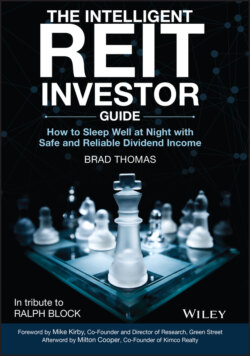Читать книгу The Intelligent REIT Investor Guide - Brad Thomas - Страница 15
Lower Volatility
ОглавлениеA stock's volatility refers to how much its price tends to bounce around from day to day or even hour to hour. Over the past four decades or so, REITs have proved to be less volatile than other equities on a daily basis. This has even been despite their increasing size and popularity, which has brought in new investors with different agendas and shorter time horizons.
Another factor that usually helps tamp down on such issues is REITs’ higher dividend yields. When a stock yields next to nothing, its entire value is comprised of all future earnings, discounted to the present date. If the perceived prospects for those earnings decline even just slightly, the stock can plummet. However, much of a REIT's value is in its current dividend yield. So a modest decline in future growth expectations will have a more muted effect on its trading price.
It's true that their volatility spiked from 2007 through 2009 due to concerns about their balance sheets and the American economy. And in 2020, the Covid‐19 pandemic also caused significant REIT volatility, though shares still didn't fall as hard as they did in 2008. This is because most of them were already reducing leverage and building up access to capital to strengthen their liquidity, which helped them immensely.
On the larger issue of volatility, Cohen & Steers adds, “At its Core, real estate exists to support basic needs of individuals and businesses, providing shelter and facilitating commerce.” And there will always be demand in that regard. It's only a matter of whether those needs are “housed in a different form or location,” or reflect “current preferences, such as residents moving from multifamily apartments in dense cities to suburban single‐family homes.”
Investment trends can change quickly and unexpectedly. In some years, REIT stocks will be very popular; in others, they'll be all but ignored. Admittedly, some “trends may be more permanent: accelerated e‐commerce adoption driving demand for industrial/logistics at the expense of retail.” Some examples include “greater reliance on digital infrastructure benefiting data centers and cell towers” and “increasing acceptance of work from home affecting office utilization.”
The rise of hedge funds – including those with very short time horizons – has added another wild card to the deck. REITs can sometimes become the sandbox in which these funds like to play, bringing more volatility with them than there otherwise would, or should, be.
The reason I bring this up is because it's important to know what can cause volatility in the stocks we purchase, REITs or otherwise. When our stocks go up, it's too easy to ignore risk in our pursuit of ever‐greater profits. And when our stocks drop, we too often tend to panic, dumping otherwise sound investments because we're afraid of ever greater losses.
Consider missed market expectations, which can play havoc on otherwise stable stocks. Let's say you own shares in a “regular” company that reports a 15% year‐over‐year increase in earnings. Yet because analysts expected a 20% increase, the stock drops. That scenario has played out more than once.
Fortunately, REITs are superior to most common stocks in this regard. Analysts who follow these companies are normally able to accurately forecast quarterly results, within one or two cents, quarter after quarter. This is because of the sheer predictability of the operations at work, especially when it comes to any property type that uses long‐term leases (which is most of them). That provides earnings stability that can't be found very easily elsewhere, further reducing both risk and volatility.
As a result, relatively few REITs have gotten themselves into serious financial difficulties over the years. Those that did were generally poorly managed and/or burdened by risky balance sheets.
